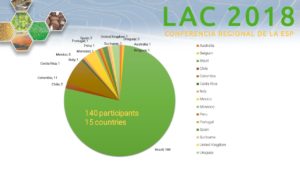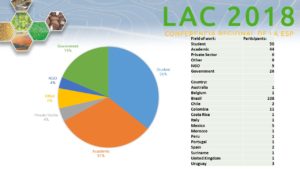Welcome to the official webpage of the Brazil ESP national network. If you would like to visit this network’s discussion board, please click here (members only).
Veja abaixo as informações em Português.
Lead team
If you are interested in becoming a member of this national network or joining the lead team, please contact the current lead team members. If you don’t hear back from the lead team, please contact the secretariat at [email protected].
Introduction & Objectives
ESP National Networks aim to improve decision making on ecosystem services by providing a platform for researchers, government, non-government, business, industry and communities to exchange information and experiences on the theoretical and practical application of ecosystem services at local to national scales. In January 2016, the ESP – Brazilian Network was approved.
It’s a great opportunity to strengthen the Brazilian Network in ES and disseminate the research in our country. This will generate recognition of our group, opportunities to work in partnership, exchange of knowledge and experiences, and other advantages. Suggestions to improve communication and information flow are very welcome!
Objectives of ESP
The ESP aims to improve communication, coordination and cooperation, and also build a strong network of individuals and organizations. Furthermore, it reinforces and encourages diversity of approaches, and reduce unnecessary duplication of effort in the conceptualization and implementation of ES.
Become a member of our national network
The ESP has a worldwide network to enhance the science and practical application of the evaluation of ES. Currently, more than 2500 people from all continents and many organizations are connected in ESP.
By becoming a member of the Brazilian network, you have the opportunity to share knowledge and collaborate with other professionals working with science, policy and practice of ecosystem services. You will also have access to more than 60 working groups. For this, after registering on the ESP website, request to join the Brazilian network.
Updates – March, 2019.
- Congratulations to our Chair, Ana Turetta, who was elected to be part of ESP’s Steering Committee.
- Our colleague Leandra Gonçalves from the Brazilian Platform for Biodiversity and Ecosystem Services (BPBES) participated in the development of the Global Environment Outlook. The Global Environment Outlook-6: Healthy Planet, Healthy People (GEO-6), released on March 13, 2019, covers all environmental issues and their link to human health. Read more.
- Information about the PES Project “Conexão Mata Atlântica” (Atlantic Forest Connection). Find the latest developments in São Paulo and Rio de Janeiro here and here
- Last month, São Paulo Research Foundation (FAPESP), under the BIOTA Program, BPBES and the Brazilian Plant-Pollinator Interactions Network (REBIPP) launched the Summary for Decision-makers of the 1st -Thematic Report on Pollinators, Pollination and Food Production in Brazil. The report can be downloaded here.
- There are also many recent papers relevant for the Brazil NN. Read more.
Notícias passadas:
Prezados integrantes da rede brasileira do ESP,
obrigada por terem participado do nosso encontro na semana passada em Campinas! Consideramos que tenha sido um sucesso!
Foram 140 participantes de 15 países; representantes de diversos setores da sociedade como governo, ensino e pesquisa, sociedade civil.
O encontro permitiu a integração dos participantes e discussões muito interessantes foram possíveis durante esses dias de trabalho. Estamos motivados a manter cada vez mais ativa a nossa rede e, para isso, contamos com vocês! Todas as sugestões que surgiram na reunião do capítulo foram anotadas e, aos poucos, daremos andamento às sugestões que surgiram!
Fiquem à vontade para entrar em contato e compartilharem notícias, publicações, eventos e o que mais considerarem relevante para a nossa rede, assim como repassarem essa mensagem para suas redes de trabalho.
Compartilhamos algumas reportagens sobre o evento:
http://www.unicamp.br/unicamp/noticias/2018/10/26/pesquisadores-latino-americanos-discutem-servicos-ecossistemicos-no-contexto?fbclid=IwAR12t-LVvpFJPVLvlM80wBjRnSegmTDyP8Aw5DeProL8ZhRboxjnXJT7aZ4
https://www.rtv.unicamp.br/?audio_listing=reporter-unicamp-entrevista-carlos-joly
https://www.embrapa.br/busca-de-noticias/-/noticia/38913943/campinas-foi-palco-do-debate-sobre-servicos-ecossistemicos-na-america-latina-e-caribe
Obrigada!! Abraços!!
Ana Turetta, Camila Ortolan & Maíra Padgurschi


Para se inscrever e receber o boletim https://www.bpbes.net.br/boletim-interfaces
The 2nd Ecosystem Services Partnership Regional Conference 2018 – Latin America and Caribbean – will be held in Campinas, Brazil, from 22 nd – 25th October.
Save the date!
Versão em Português
Em Janeiro de 2016, foi aprovada a criação da rede brasileira do ESP.
É uma grande oportunidade para fortalecermos a rede brasileira em serviços ambientais e divulgar os trabalhos que realizamos em nosso país. Isso gerará reconhecimento do nosso grupo, possibilidades de trabalhos em parceria, troca de conhecimento e experiências, entre tantas outras vantagens. Sugestões para melhorar a comunicação e fluxo de informações são muito bem vindas!
Objetivos da ESP:
O ESP visa melhorar a comunicação, coordenação e cooperação, e também construir uma forte rede de indivíduos e organizações. Além disso, reforça e incentiva a diversidade de abordagens, além de reduzir a duplicação desnecessária de esforços na conceituação e aplicação dos serviços ecossistêmicos.
Torne-se um membro da nossa Rede Nacional:
A ESP possui uma rede mundial para melhorar a ciência e a aplicação prática da avaliação de serviços de ecossistêmicos. Atualmente, mais de 1.500 pessoas de todos os continentes e muitas organizações estão conectadas a ESP.
Ao se tornar um membro da rede brasileira, você tem a oportunidade de compartilhar conhecimentos e colaborar com outros profissionais que trabalham com a ciência, a política e a prática dos serviços ecossistêmicos. Você também terá acesso a mais de 60 grupos de trabalho. Para isso, após se cadastrar no site da ESP, solicite a sua adesão à rede brasileira.
